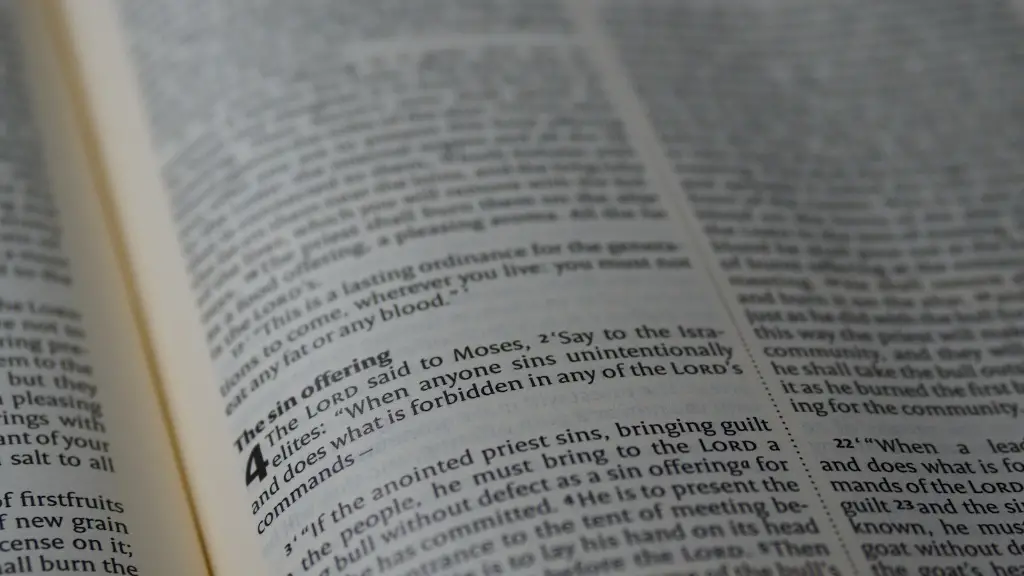Background
Paul was a Jewish religious leader who is traditionally seen as the author of several New Testament books. He is arguably one of the most influential figures in Christianity. Paul was a prolific writer and preacher and was an important leader in the early church. But how did he die in the Bible?
What the Bible Says
The Bible does not actually say how Paul died. The Bible records the events of Paul’s imprisonment and conversion and his preaching missions, but the Bible does not provide any information of his death. Paul’s last recorded words are “I am already being poured out like a drink offering, and the time of my departure is near.” However, there is no clear indication of when or how he died. The traditional belief is Paul was martyred for his faith in Rome during the reign of the Emperor Nero.
Scholars have speculated that Paul was beheaded at the orders of Nero, which would have been a common form of execution of the time. Others have speculated that Paul lived many years after his final recorded words, and some even suggest that Paul died peacefully of old age. Ultimately, the Bible does not specify the cause of Paul’s death.
Why Was Paul Martyrdom So Important?
Paul’s martyrdom was of great importance to the early church. Paul’s martyrdom was seen as a sign of his faithfulness and devotion to God, and it was used as a powerful example to encourage other believers. Paul’s martyrdom was also a powerful symbol of the strength of the Christian faith and a testimony to its growing power in the Roman world. At its most basic level, Paul’s martyrdom was a demonstration of the power of love and faith in God that was greater than fear of death.
Paul’s martyrdom was also significant as it marked the transition from the old covenant to the new covenant, which was established by Jesus Christ.Paul’s martyrdom symbolized the end of Jewish religious law, and the beginning of a new era of faith based on the teachings of Jesus. This transition served as a confirmation of the truth of the gospel and the power of Christianity.
What Was Paul’s Legacy?
Paul’s legacy was that of a great missionary and defender of the faith. His writings, letters, and teachings had a profound impact on the development of Christianity. He shaped many of the foundational doctrines of the faith and was instrumental in the spread of Christianity from its cradle in the Middle East to its eventual global expansion.
Paul’s legacy also includes his example of faithfulness and courage. Paul’s commitment to his faith and his willingness to give up his life for it have served as an inspiration to countless Christians throughout history. Paul’s martyrdom also played a crucial role in energizing the early church and motivating them to spread the gospel to the ends of the earth.
Analysis
Paul’s death in the Bible is typically seen in a positive light, with Paul being celebrated as a martyr who died for his faith. However, it is important to understand that Paul’s death was the result of a violent and brutal persecution of Christians in the Roman Empire. It is also important to remember that Paul and the early church were fighting for religious freedom in a world where people were still commonly persecuted for their beliefs.
Paul’s death also serves as a reminder of the enduring power of faith and love. Paul’s death is a powerful symbol of the power of love, courage, and faith in God, and it serves as an example that has inspired generations of Christians. Paul’s death is a powerful testament to the strength and courage of the early church, and it serves as a reminder of the power of faith to sustain us even in the face of great danger.
The Early Church and the Martyrdom of Paul
Paul’s martyrdom was a pivotal moment for the early church, as it served as a turning point in their development. Through the example of Paul’s faithfulness, the early church was empowered to spread the gospel to the ends of the earth and to courageously stand up against a hostile society. Paul’s death is understood as a pivotal moment in the development of Christian theology, as it marked the transition from the old covenant to the new covenant that was established by Jesus.
Paul’s martyrdom also served as a sign of the strength and resilience of the early church. Despite facing intense persecution, the church was still able to spread the gospel throughout the Roman Empire and beyond. Paul’s death also marked a turning point from the persecution of Christians to the eventual acceptance of Christianity by the Roman Empire.
Paul’s death is also seen as a confirmation of the truth of the gospel and of Christianity. His death, and the steadfast faith with which he faced it, serves as a powerful testimony to the power of faith and love in a hostile world. Paul’s death was an important moment in the establishment of Christianity, and it helped to shape the Christian faith as we know it today.
Modern Reflections On Paul’s Martyrdom
Modern reflections on Paul’s martyrdom are often focused on his example of faithfulness, courage, and devotion to God. Paul is seen as a model of faith and perseverance, and his faithfulness is an inspiring example that has been a source of encouragement for countless Christians throughout history. Paul’s death is also seen as a testament to the strength of faith, and it serves as a reminder that even in the face of great danger, faith and love can sustain us.
Paul’s death is also seen as a reminder of the importance of religious freedom. The early church was fighting for the right to practice their faith in a world where people were still regularly persecuted because of their beliefs. Paul’s death serves as a reminder that religious freedom is an important right and should be respected and defended.
Paul’s death is also seen as a powerful symbol of the power of love and of the power of faith. Paul’s faithfulness and willingness to give up his life for his beliefs serves as an example of selfless love and courage that has been an inspiration for generations of Christians. Paul’s martyrdom is a powerful reminder of the power of faith, and it serves as an enduring symbol of the strength of love and the power of faith in the face of great danger.
Conclusion
Paul’s martyrdom is an important moment in the history of Christianity and a powerful example for Christians today. Paul’s death is a powerful symbol of the strength of faith, courage, and love and serves as an example of faithfulness that has inspired countless Christians throughout history. Paul’s martyrdom is a reminder of the power of love and of the importance of religious freedom, and it serves as an enduring reminder of the power of faith in the face of great danger.





